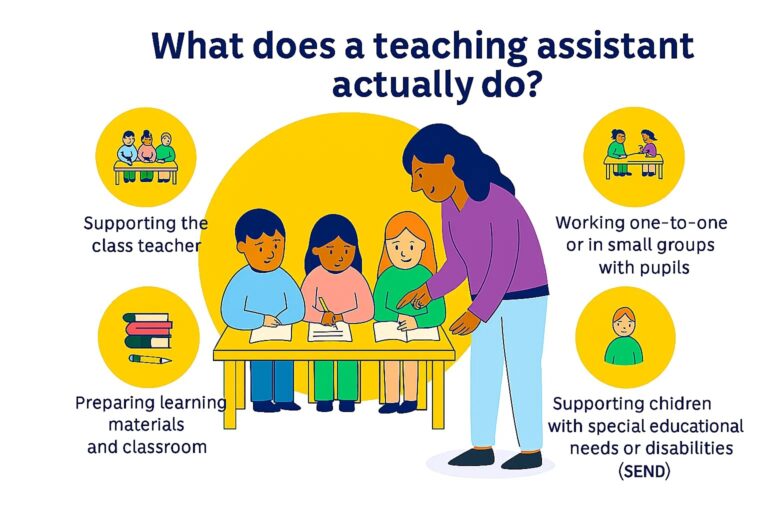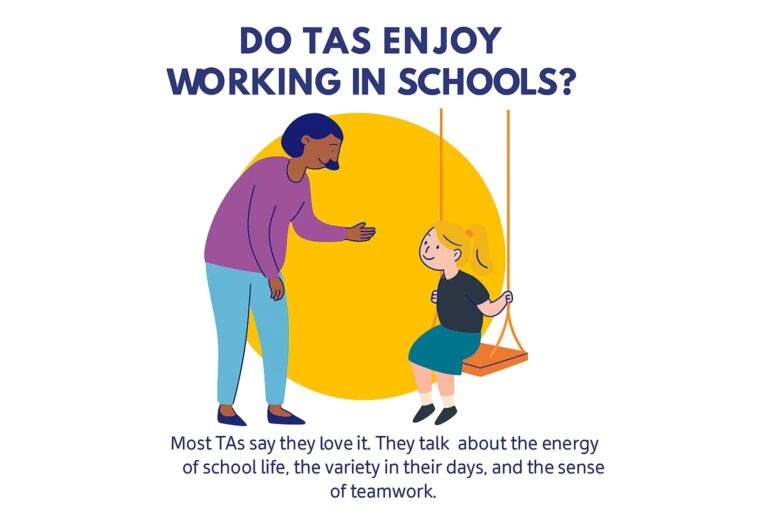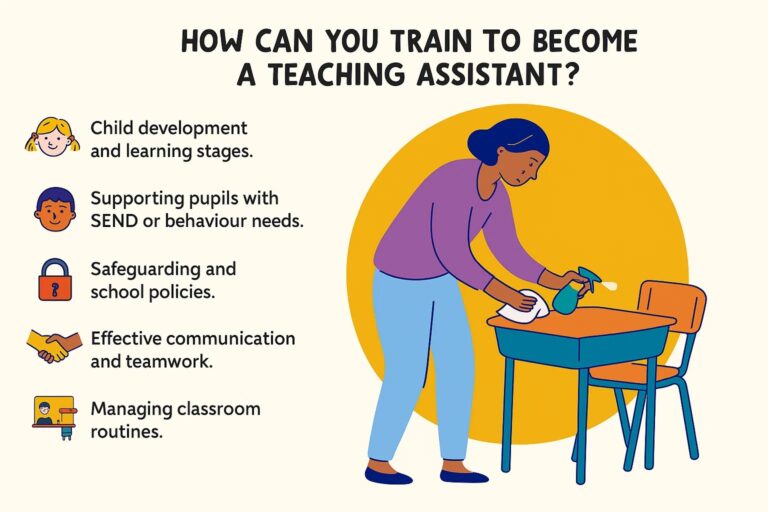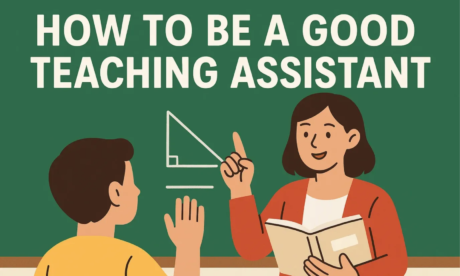If you’ve ever stepped into a classroom, you’ve probably seen them — the calm, helpful people sitting beside a pupil who’s finding the work tricky, or helping a small group with reading. They’re not the teacher, but without them, many lessons just wouldn’t run smoothly. Those people are teaching assistants (TAs), and they’re one of the most important parts of school life. In fact, in England, support staff make up nearly a third of the whole school workforce. That means almost one in three adults working in schools are there to support pupils and teachers — not just to teach, but to make sure learning actually happens for everyone. But why do people become TAs?
The answer usually isn’t about money. It’s about doing something meaningful, fitting work around family life, and being part of something that matters every single day. Let’s look at what TAs do, why people love the role, and how it fits into modern school life in the UK.
What Does a Teaching Assistant Actually Do?

A teaching assistant’s job looks simple on paper — but in reality, it covers a lot. You’re part helper, part motivator, part problem-solver, and sometimes even part superhero. Here’s what a typical day might involve:
- Supporting the class teacher during lessons.
- Working one-to-one or in small groups with pupils who need extra help — maybe with reading, maths, behaviour, or confidence.
- Preparing learning materials and classroom displays before lessons.
- Helping with behaviour management and general supervision around the school.
- Supporting children with special educational needs or disabilities (SEND), and sometimes helping with personal care.
- Feeding back to the teacher or SENCO (Special Educational Needs Coordinator) about how pupils are doing.
Some TAs focus on one child full-time, others float between groups, and some specialise in areas like language support or autism. Every school uses its TAs slightly differently, but the heart of the role is the same everywhere — helping pupils learn and feel included.
Why Do People Become TAs?
Most people don’t wake up one day and randomly decide to be a TA. They’re drawn to it for a reason — sometimes personal, sometimes practical, sometimes both. Some common reasons people give include:
- They want a job that feels meaningful day to day.
- They love working with children and young people, but don’t want the full responsibility or workload of a teacher.
- They’re looking for school hours that fit around family life — especially parents who want to work while their children are in school.
- They want to get into education without jumping straight into a degree or Qualified Teacher Status (QTS).
- They’re looking for a career change that feels rewarding and human, not just routine.
In other words, most people who become TAs want to do work that matters and that fits into real life.
Do People Become TAs to Help Children Learn?
Yes — and this is probably the biggest reason of all.
Teaching assistants often talk about the joy of seeing small progress moments up close — like a child finally reading a tricky word or staying calm through a whole morning when that used to be impossible. Those little wins mean everything. Around one in five pupils in UK schools has some level of special educational need or disability (SEND). That’s a lot of children who need an extra hand, a calm adult, or just someone who can explain things a different way.
TAs are the ones who make inclusion real. They turn “every child matters” from a slogan into everyday action. It’s not just about learning; it’s about giving each pupil a fair chance to succeed. For many people, that’s the part of the job that makes it deeply rewarding.
Is Being a TA a Good First Step Into Teaching?
Definitely — it’s one of the best ways to get experience before you commit to full teacher training.
Lots of trainee teachers start their journey as TAs. The role gives you a front-row seat to how classrooms really work. You’ll learn behaviour management, lesson structure, safeguarding, SEND support, and the rhythm of school life long before you ever stand in front of a class yourself.
If you’re thinking about starting out, the blog Is Being a Teaching Assistant Worth It? (UK) from Unified Course explores exactly why so many people choose this path — from the hands-on experience it provides to how it can shape your future in education.
By the time you apply for teacher training, you already know what the job involves — not just the good parts, but the challenging ones too. That makes you a stronger candidate and a more confident teacher later. And if you decide teaching isn’t for you? You’ve still got a valuable qualification, school experience, and a role you can enjoy long-term.
Do TAs Enjoy Working in Schools?

Most TAs say they love it. They talk about the energy of school life, the variety in their days, and the sense of teamwork.
There’s something special about being part of a community that shapes young minds. You see pupils grow, gain confidence, and achieve things they never thought possible. Many TAs enjoy school events, trips, and creative projects — they get to take part without having to do the planning or paperwork teachers deal with.
Of course, not every day is easy. Sometimes you’ll deal with behaviour issues, tears, or tiredness. But for most TAs, the tough days don’t outweigh the good ones. What tends to lower job enjoyment isn’t the children — it’s when the pay doesn’t match the responsibility or when the workload creeps up without enough support. But in a good school, with fair expectations and supportive teachers, the job can feel incredibly satisfying.
Can Being a TA Fit Around Family Life?
Yes — and this is one of the biggest reasons so many people choose the role.
Most TA jobs run on school hours, around 8:30am to 3:30pm, term-time only. That means you’re off when your children are off, and your evenings are usually free. You don’t take marking or planning home, so you can actually switch off at the end of the day. For parents, this balance is gold. You can work, earn, and still be there for school runs and holidays.
Some people even pick part-time or mornings-only TA jobs to fit perfectly around childcare or other commitments. That flexibility makes the job one of the most family-friendly roles out there.
Do TAs Choose the Role for Job Stability or Flexibility?
The truth is — both.
Stability is a big draw because schools will always need classroom support. With rising numbers of pupils with SEND, TAs aren’t going anywhere. Many schools simply can’t function well without them. At the same time, flexibility is another major benefit. There are lots of part-time, temporary, and one-to-one-funded posts, so people can choose hours that work for them. Whether you want a long-term full-time post or something shorter around other life commitments, there’s usually a TA role that fits.
What Skills Do People Gain from Being a TA?
Working as a teaching assistant builds a surprising number of skills that you can use anywhere — not just in education. You learn how to:
- Manage behaviour calmly and effectively.
- Support children with SEND, autism, ADHD, or emotional needs.
- Communicate clearly with teachers, parents, and other professionals.
- Stay organised with lesson prep, displays, and paperwork.
- Think on your feet and adapt when plans change.
Those are skills that employers value in almost any setting — from childcare to social work to management.
Many TAs go on to become Higher Level Teaching Assistants (HLTAs), pastoral workers, or SEND specialists. Some move into school administration, or even train as teachers. A CPD-accredited Teaching Assistant Course is a smart first step because it teaches you those skills in a structured, recognised way — so you can apply them confidently and progress faster.
Is Being a TA a Rewarding Career?
Absolutely.
If you measure reward by the size of your impact, not the size of your payslip, being a TA is one of the most rewarding jobs out there. You see children grow, overcome challenges, and gain skills for life — and you know you helped make that happen. You build relationships with pupils who might struggle elsewhere, and you become a trusted adult in their world.
Some days will test your patience, but many more will fill you with pride. You’ll laugh, you’ll learn, and you’ll go home knowing you’ve made a difference. And if you ever want to climb higher, you can. With training, TAs can move into HLTA, SEN, pastoral, or teacher training routes. Each path brings new challenges and new rewards.
Why the UK Needs Teaching Assistants More Than Ever
Schools today are busier and more complex than ever. Class sizes are bigger, pupil needs are wider, and teachers have more to juggle.
That’s why teaching assistants are so vital. They make it possible for every child — regardless of ability or background — to get the attention they need. Whether it’s helping a child with dyslexia read confidently, supporting a pupil with autism through changes in routine, or encouraging a quiet child to speak up, TAs change lives daily. Without them, inclusion would be just a nice idea. With them, it’s a reality. That’s also why the demand for skilled, trained TAs keeps rising — and why training matters so much.
How Can You Train to Become a Teaching Assistant?

The good news is, you don’t need a degree to start. You just need the right course and a genuine interest in helping children learn. A Teaching Assistant Course gives you everything you need to get started. You’ll learn about:
- Child development and learning stages.
- Supporting pupils with SEND or behaviour needs.
- Safeguarding and school policies.
- Effective communication and teamwork.
- Managing classroom routines.
Once you complete the course, you’ll have a certificate recognised by schools across the UK. It shows that you’ve trained properly, understand your responsibilities, and can work safely with pupils. At Unified Course, our CPD-accredited course is designed to be practical and easy to follow — even if you’re completely new to education. You can study online, in your own time, and start applying for TA jobs as soon as you qualify.
What’s the Career Path After Becoming a TA?
Once you’ve gained experience, there’s no shortage of ways to grow.
Here’s how many TAs build their career step by step:
- Start as a classroom TA, helping teachers and pupils daily.
- Move up to a 1:1 SEND support role — more focused, often higher paid.
- Train as a Higher Level Teaching Assistant (HLTA) and take on more responsibility.
- Step into pastoral or behaviour support, focusing on wellbeing.
- Become a SEN specialist, working with children with complex needs.
- Or take the leap into teacher training when you’re ready.
Each stage builds on the last, and every new skill or qualification gives you more choices. That’s why investing in your training early pays off.
Do You Need Qualifications to Work as a TA?
Most schools prefer candidates with recognised training — especially for roles that involve SEND or behaviour support. You don’t always need previous experience, but you do need the confidence to work with children safely and positively. That’s where a course helps.
An online Teaching Assistant Course gives you the essential knowledge schools look for and helps you stand out when applying for jobs. It shows you’re serious about your role and already understand how to support learning effectively.
What Makes a Great Teaching Assistant?
Being a great TA isn’t about fancy words or perfect grammar — it’s about attitude and heart. The best TAs are:
- Patient: They stay calm when pupils struggle or misbehave.
- Caring: They notice when a child feels left out or upset.
- Flexible: They adapt when plans change (because they always do).
- Team players: They support teachers and other staff without fuss.
- Positive: They celebrate small wins and keep pupils motivated.
You can learn techniques and policies from a course, but these human qualities are what make the job special.
Is There Job Security for TAs in the UK?
Yes — and it’s growing stronger every year.
Schools always need TAs because inclusion is a core part of the UK education system. Pupils with SEND, language barriers, or social challenges need one-to-one or small-group support to thrive. Even when budgets tighten, many headteachers protect their TA teams because they know how essential they are. If you add extra skills — like autism awareness, speech and language support, or first aid — you make yourself even more valuable and harder to replace.
Final Thoughts: Why So Many People Choose to Be Teaching Assistants
So, why do people become TAs?
Because it’s meaningful. Because it fits around life, and it opens doors. People choose this career because they want to do something that matters — not just for one child, but for whole classrooms. They stay because they see the difference they make every single day.
It’s not about chasing a big salary. It’s about purpose, pride, and people. Schools keep hiring TAs because they make inclusion possible, help manage behaviour, and support learning where it counts most — in the classroom. That means steady demand, growing opportunities, and plenty of room to learn and progress. If you want to start a career that makes a difference — one that fits around family life and gives you real skills — now’s the time to take that first step.
Train with a CPD-accredited Teaching Assistant Course at Unified Course, get qualified, and start building a rewarding future in education. Every great school needs great TAs — and that could be you.
Frequently Asked Questions (FAQ)
1. Why do people be TAs?
- People become TAs to support teachers, gain classroom experience, and make a difference in students’ learning and development.
2. Why do people become teaching assistants?
- Many choose this role for job satisfaction, school experience before teacher training, or the joy of helping children progress.
3. Why are schools getting rid of TAs?
- Budget pressures and funding cuts lead some schools to reduce TA positions despite their vital classroom support.
4. How much do TAs get paid in the UK?
- Teaching assistants typically earn between £18,000 and £27,000 annually, depending on location, experience, and school funding.
5. Is being a TA a stressful job?
- It can be. Managing multiple student needs and workloads can be challenging, though it’s also highly rewarding.
6. Do TAs get paid for lunch?
- Usually not. Most TAs have unpaid lunch breaks, though policies vary by school or contract type.
7. Do TAs get paid over the summer?
- Term-time contracts usually exclude summer pay, but annualized pay arrangements can spread wages across the year.
8. What is the 70 30 rule in teaching?
- The 70/30 rule suggests students should engage in learning activities 70% of the time, with teachers leading 30%.
9. Do TAs get a teacher pension?
- Yes, most TAs are eligible for the Local Government Pension Scheme (LGPS), offering stable long-term benefits.




